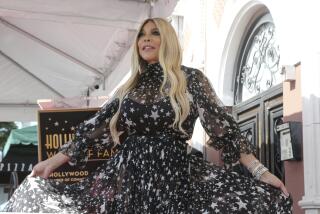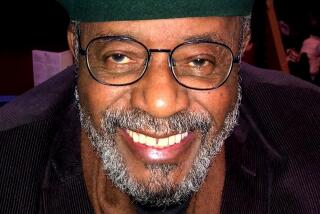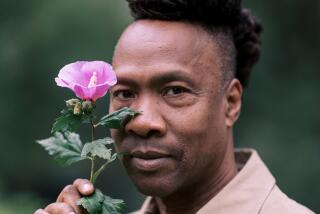Obituaries : Edward B. Williams; Famous and Powerful Lawyer, Sports Figure
- Share via
WASHINGTON — Edward Bennett Williams, the locomotive of the law who charmed thousands of jurors, set the pace for a generation of trial lawyers and, from a private position, became a powerhouse in the public arenas of politics and sports, died Saturday at 68 after an 11-year, seven-operation war against cancer.
Williams, a founder of the prominent Washington law firm of Williams & Connolly, a former owner of the Washington Redskins and the current owner of the Baltimore Orioles, died Saturday at Georgetown University Hospital here.
From his perch as “the country’s top criminal lawyer,” as Time magazine once called him, Williams “had absolute influence touching all facets of Washington without holding any position,” said Joe Califano, a former law partner and a cabinet member in the Jimmy Carter Administration.
Best at Anything
“He was the best,” Califano said Saturday. “He was the best everything. He was the best father, the best husband, the best lawyer, the best partner, the best friend . . . and he was extraordinarily brave.”
Columnist Art Buchwald, a close friend, once said of Williams: “There are guys who love him and there are others who’d like to throw him out the window.” Former Redskins football coach George Allen called him “devious and deceitful.” To Richard Nixon, Williams was an expletive deleted and a “bad man” who earned a place at the top of the White House enemies list.
Without office or titles, he wielded enormous power. Williams was such a proud member of the Washington Establishment that when he concluded that Carter was contemptuous of the city’s power elite, the lifelong Democrat led a drive to deny the President his party’s 1980 nomination.
“In 15 years of having the office next to his, I don’t think I’ve seen a presidential campaign where every candidate from both parties didn’t come see him for advice,” said Brendan Sullivan, one of four Williams & Connolly partners who will manage the 110-lawyer firm.
Williams’ sports teams made him a household name in the Washington area. He ran the Washington Redskins for 14 years, giving up control in 1979, although he retained a minority interest in the team. He owned the Baltimore Orioles for the last nine years.
People in Trouble
But the centerpiece of Williams’ life was the courtroom and the law firm he built into one of the nation’s more important. Williams & Connolly is a group of hard-charging, expensive lawyers who specialize in going to court on behalf of people in the worst trouble of their lives.
His love of the law led Williams to turn down repeated offers of government jobs. Former President Lyndon B. Johnson wanted Williams to be the first mayor of Washington. Gerald Ford wanted him to run the CIA. So did Ronald Reagan. Each time, Williams declined. The only positions he might have taken were Supreme Court justice and attorney general, he said.
Unlike lawyers who measure their clients by title, wealth, notoriety or cause, Williams was intrigued primarily by the depth of a client’s despair.
“We wanted to be a very powerful firm, for people in deep, deep trouble,” Califano said.
For a time, especially in the 1950s and ‘60s, Williams was best known as a defender of shady characters whose names were tabloid staples--gangster Frank Costello, Teamsters boss Jimmy Hoffa, and Sen. Joseph McCarthy.
Famous Clients
He made his reputation taking on clients who had plenty of trouble, enough money and precious little public sympathy--people such as New York Yankees owner George Steinbrenner, U.S. Rep. Adam Clayton Powell, fugitive financier Robert Vesco and Johnson aide Bobby Baker.
For three decades, Williams was an especially close adviser to the Washington Post. In the early 1960s, Williams helped Publisher Philip L. Graham in his battle with mental illness. In 1985, he went before the U.S. Court of Appeals two weeks after a cancer operation to defend the newspaper in a libel case brought by William Tavoulareas, the former president of Mobil Oil.
Williams’ dedication to his clients was total. During the Watergate scandal, when Califano filed suit on behalf of the Democratic National Committee against the Committee to Re-Elect the President, leaders of the Teamsters, then one of the firm’s larger clients, were infuriated. They demanded that Williams & Connolly drop the suit.
“Ed had represented the Teamsters for years,” Califano said. “Seven of our 25 lawyers then worked on Teamsters business. We had a 10-minute meeting about what to do. Ed said, ‘Look, nobody tells us who our clients are. Go ahead with your lawsuit.’ The Teamsters walked out immediately. It was very costly, but Ed made the decision instantly.”
Although he attracted high-profile clients, Williams never relished the celebrity lawyer role perfected by Melvin Belli and F. Lee Bailey. He was not the type to stage press conferences. Instead, he would hole himself up for days on end, absorbing detail, rehearsing arguments.
Packed the Courtroom
As recently as 1986, Williams was still polishing his courtroom reputation. In Miami to defend RC Cola magnate Victor Posner against tax evasion charges, Williams packed the courtroom. Lawyers lined up for seats hours before show time. Inside the empty room, exhausted from cancer treatments, Williams spent 30 minutes pacing in front of an empty jury box, silently rehearsing his final argument. When the jury came in, Williams held forth for 159 minutes, standing the whole time, rarely glancing at his notes.
“He’s only the second man I’ve ever seen who’s lived up to his reputation,” Harley Tropin, a lawyer, told a reporter. “The first was Sandy Koufax.”
Williams was born May 31, 1920, the only child of a department store floorwalker in Hartford, Conn. When his father was laid off during the Depression, the vice principal of his high school got him a scholarship at Holy Cross, the rigidly disciplined Jesuit college at Worcester, Mass.
He joined the Army Air Force in World War II, but was soon injured in the crash of a training plane--everyone else aboard was killed--and was discharged. He enrolled at the Georgetown University Law School in Washington.
Even before he passed the Bar, Hogan & Hartson, then the capital’s second-largest law firm, hired him on Georgetown’s recommendation.
A Man of Faith
After marrying his boss’ daughter, Dorothy Adair, Williams hung out his own shingle. She died, at age 34, of a respiratory illness, and Williams married Agnes Neill, then a top lawyer in his own firm, a year later. He had three children by his first marriage, four by the second.
He was a man of ritual and faith, attending 7 a.m. Mass every day at Trinity Church. But that was private, something he did not discuss even with the best of friends. In public, Williams’ faith was what he called “contest living,” an attitude in which nearly every moment in life is defined by victory or defeat.
In his final years, Williams made several heroic recoveries from cancer operations on his colon, lung and liver. Until a month before his death, Williams worked more hours than any other lawyer in his firm. But in the final weeks, his strength wore down early each day.
Williams’ final moment of satisfaction came on May 31, when his daughter, Ellen, gave birth to a son. The boy, named Edward, after his grandfather, was born on Edward Bennett Williams’ birthday.
Williams maintained an active involvement in sports. Story in Sports, Page 6.
More to Read
Go beyond the scoreboard
Get the latest on L.A.'s teams in the daily Sports Report newsletter.
You may occasionally receive promotional content from the Los Angeles Times.










